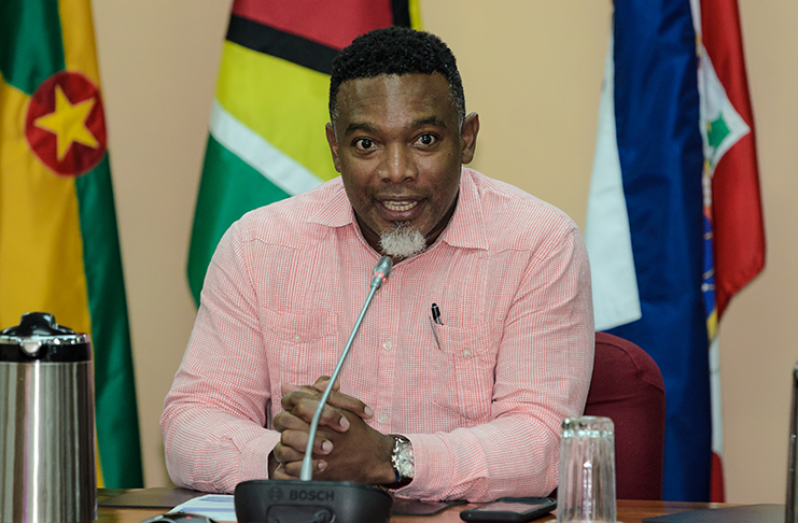…CARICOM official urges
By Tamica Garnett
IF the Guyana Power and Light Inc (GPL) is to properly address issues with which it is currently confronted, it needs to integrate greater private participation in power generation and move to focus more on electricity transmission and distribution, than on generation.
“The issue of private investment in the energy sector is an important one if GPL is to make the kind of progress that is required to solve some of those generation problems,” emphasised Devon Gardner, Programme Manager for Energy and Head of the Energy Unit at the Caribbean Community (CARICOM) Secretariat.
“If GPL was able to focus on transmission and distribution a lot more, and allow the private generators to generate and sell to them, then they would be able to focus on what utilities typically do, which is figuring out how to move the electricity from where it is being generated to the demand centres.”
Over the years, GPL has grappled with both generation and transmission issues. In a recent sit down with the Guyana Chronicle, Gardner said it would be a lot easier for the company to address issues if all it had to handle were transmission and distribution.
“The core function of the utility is the management of the grid, the generation of power to put into the grid is not a core function of a utility, in a modern dispensation,” Gardner explained.
“The modern paradigm of utilities is one in which the core function of the utility is really about planning for the supply. They need to know how much supply they need for the customers, what kind of supply they require and then find the appropriate means by which that supply can come into the system. So what they are supposed to be doing is acting as systems management. By its very definition the grid really starts at the substation and takes the electricity from the substation to the customers at the meter.”
In Guyana, the state-owned GPL is a vertically integrated utility with a monopoly on the transmission and distribution of electricity. The generation is largely handled by Power Producers and Distributors Incorporated (PPDI), which is also state-owned, and contracted to operate and maintain the power plants on behalf of GPL.
PPDI was established in 2016 to take over power plants previously operated and maintained by Wartsila Operations Guyana Inc.
“Being able to desegregate that kind of business and allow private participants in the sector, where there is a mechanism that allows those entities who have the resources to so do, to generate the power and sell it to the utility at a cost that is reasonable, those are the kind of things that would help to move things quickly,” Gardner said.
PPDI is responsible for a total electrical output of 106.7 megawatts within the Demerara to Berbice Interconnected System DBIS, sourcing from four power plants, namely Garden of Eden (22 MW), Kingston #1 (22MW), Kingston #2 (36.3 MW) and Vreed-en-Hoop (26.4 MW).
This situation is wholly insufficient, and GPL has continued to explore its options including IPP. Power Purchase Agreements (PPA) are currently being pursued with Giftland Mall and Banks DIH Ltd. However, those are only for five megawatts each, during peak hours, in a country that uses approximately 800 kilowatts per year.
The company had also engaged a number of IPPs in Essequibo last year.
“Unless GPL is getting IPPs becoming a major part of the energy sector and producing the energy, then we are going to continue [to] have the challenge of GPL struggling to balance generation while it’s grappling with the issues such as transmission and distribution,” Gardner conveyed.
However, there remain hurdles that must be overcome towards this end.
In its current state, GPL’s licence restricts it from purchasing power from IPPs other than those which produce power from renewable energy sources. It also does not include IPPs whose main business is not the generation of power and which supply no more than 10 megawatts (MW).
In September, the Ministry of Public Infrastructure began moving to amend GPL’s licence to widen the purchasing of power from external sources. Gardner’s unit at CARICOM is tasked with the identification of common policies and strategies for transforming the energy sector within the Caribbean Community (CARICOM).
The CARICOM Energy Programme is currently putting heavy focus on renewable energy in the CARICOM member states. Gardner notes that aside from policies allowing the use of IPPs, there is insufficient regulations by governments, in Guyana, and all across the Caribbean region, making investors feel secure.
“We have established a Policy and Regulations help desk at the secretariat for the energy sector, so that we can help countries to understand how to get over some of those legal impediments that are required for attracting the right kind of financing. Unless you solve those regulatory issues we are never going to get the private sector financing in the kind of way, in terms of the quantity or quality, that is required for us to advance the sector, and the governments just really don’t have the money to invest in those things,” Gardner said.












